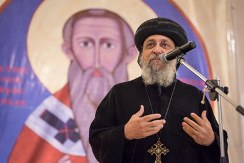'There are No Strangers Here' -- Saint Irenaeus a Key to Unity?

Contact: World Council of Churches, +41 79 507 6363; www.oikoumene.org/press
How can the early founding fathers of the church inform us as Christians in the 21st century, what stands at the centre of their theology, and how can we continue to envision a future of unity in the church? The questions were numerous as scholars, students and theologians met at the Anaphora Institute near Cairo, Egypt, to explore the theme of "Saint Irenaeus and Enlightened Humanity" on 14-16 December.
Photo: Bishop Anba Thomas. © Albin Hillert/WCC
Rector Thierry Magnin from Lyon Catholic University (UCLY) explains, "I believe the theology of Saint Iranaues is in many ways a common ground between eastern and western traditions of Christianity. At UCLY, we were first involved in cooperation with the Anaphora Institute on a formation on human rights and local development, but we have come to realize increasingly in our work that Saint Iranaeus really is a common father in our different church traditions, and so we decided to organize a conference here together, to explore this further."
A bridge between East and West
"I believe that in the Occidental culture, we try more and more today to be open to many cultures in a time of globalization. And in doing so we need to have a connection to the common Christian roots to really understand the world, and to have a globalization of the cultures," says Magnin.
"Saint Iranaeus comes from the East, but then goes to the West and forms a theology that integrates both cultures," he adds. "So when we look to his theology, the very open theology that takes into account both cultures, we can see important opportunities for today."
Fr Joshua, from the Coptic Orthodox Saint Macarius Monastery, continues, "This conference teaches us what the founding fathers said about divinisation of all humanity. Since the theology of Saint Iranaeus was brought and understood in the East, I think that Christians of the West and of the East really have one and the same theology.
"Iraneaus, as someone who is from the Eastern culture," reflects Prof. Marie-Hélène Robert from UCLY, "and who has been sent to the Occident, can make us see today that although many times we can have big discussions about one single word, in fact when we take a step back we see that our reality is exactly the same."
Robert continues, "for me, the theology of St Iranaeus is very well-adjusted and precise, but it's also exploratory of a new world. Iranaeus knows all the Gnosticisms of the world, but he is not captivated by them. He is straight, right, just, he is faithful. And for our current century I think this is very important, to see that as a Christian you can't do whatever you want to the doctrine; you have the gospel, and you have to listen to find what is good for your life."
Iranaeus and the ecumenical experience
"We can dig deep into the technicalities of theological study," says Coptic Bishop Anba Thomas of Qussia, founder of the Anaphora Institute, in looking back at the conference, "but I also want to stress the importance of the practical experience here at Anaphora."
"Saint Iranaeus focused on the worldwide church as one body," says Thomas. "And our vision at Anaphora has been to emphasize that there are no foreigners here, as in Christ, we are all one in his image. We want life to be a practical implementation of that dimension of the teachings of Saint Iranaeus, where we see the church as that beautiful image of a tree possessing deep, strong roots and open branches."
Prof. Robert continues to reflect, "meeting here at Anaphora, we can see that we are often quite different in our daily lives, we have different minds, different ways of view, but it's very good to meet and share friendship and prayer together. Meeting here is not only to send money somewhere, or to be a tourist somewhere, but it's a deep meeting, and that is important for all the church and humanity."
"We can see here that we really are each other's brothers and sisters, and not only strangers. It's important for everybody to break this bubble, to open up," Robert says.
Fr Anthony Raj, a Franciscan Capuchin priest from India and Master student at UCLY, concludes, "What strikes me in coming here as part of my studies, in learning about Iranaeus, is that we see the universal church already being here."
"I am a Catholic and may speak mostly about the Catholic church, and there are Copts, Anglicans, and Lutherans here as well," says Raj, "but when I listen to the lectures, there is no reference to a particular church tradition, or to a particular way of going about, whereas they have all been speaking of the true values of being a human being. In all these aspects we see that somehow it is not our divisions that make a difference in us, but that we are being united in the values of Christ."
*Albin Hillert is a communications consultant, writer and photographer based in Umeå, Sweden.




 Sign Up to Receive Press Releases:
Sign Up to Receive Press Releases: